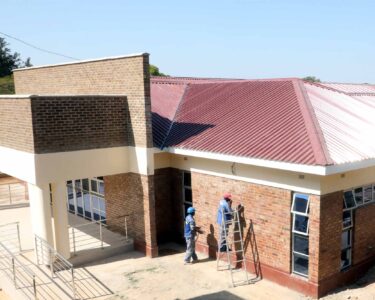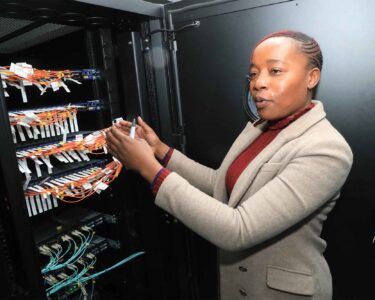Over the past few years, the shortage of students’ accommodation has given the government sleepless nights as student populations ballooned. As a result, students at most of the country’s tertiary institutions have been forced into lodgings where they are charged exorbitant rentals by their landlords. In order to cut costs, male and female students enter into what a form of cohabitation, commonly referred to as “semester marriages”, for the duration of their studies.
Realising that students were being exposed to this and other social ills, the government has been working with its private sector partners to help address the accommodation blues. As our Editor-in-Chief Munyaradzi Huni recently discovered, the thorny question of student accommodation could soon be a thing of the past.
As I was waiting for the engineer from the Infrastructure Development Bank of Zimbabwe (IDBZ) at the newly-built Bulawayo Students’ Accommodation Complex, I was beginning to lose my cool. We had arrived at the complex 9:30am and about an hour later, the engineer was nowhere in sight. “I am a only few minutes away,” he told us each time we reached him on his mobile phone.
On realising that see I was getting impatient, the economist in the office of the Minister of State for Provincial Affairs and Devolution – Bulawayo Province, Tawanda Chikomo, did his best to remind the engineer about the urgency of the situation. It was after more frantic calls that we learnt that the engineer had been assigned to another “more urgent” assignment elsewhere . . .
But, thankfully, a “Super Sub”, to use a footballing term, was on the way and her name was Belinda Ncube, or more precisely Engineer Belinda Ncube. Of course, I was angry at being stood up. But the way Eng. Ncube carried herself complemented by the air of confidence she exuded instantly changed my mood. Although I didn’t say it, IBDZ was forgiven instantly.
To spice it up, here was a bubbly lady who was proving that engineering is not a profession for the masculine sex only. And so when it came to the nuts and bolts of developments at the majestic accommodation complex, Eng. Ncube spoke proved she was certainly no greenhorn or pushover.
The subject of our visit was the 936-room, three-storey Bulawayo Students’ Accommodation Complex. Briefly, the accommodation complex is a joint venture project comprising IDBZ, Old Mutual, Zimnat and the Mining Industry Pension Funds. Located near the National University of Science and Technology (NUST), the complex is also conveniently close to the Theological College of Zimbabwe, Zimbabwe School of Mines, Bulawayo Polytechnic College and Bulawayo central business district.
It is expected to be replicated in other cities and towns with Lupane expected to be the next on the list of beneficiaries.
On hand to provide the concrete (pardon the pun) details was our host for the day, Eng. Ncube. And she did not disappoint.
“The Bulawayo Students’ Accommodation Complex will cater for about 1,812 students in 936 rooms with each room accommodating two students. For the sake of privacy, all the rooms are partitioned. The ground floor of the three-storey building is set aside for commercial use by clothing shops, food outlets, supermarkets, etc. The two upper floors will be devoted entirely to students’ accommodation,” she told Brick by Brick, adding:
“Please note that the student accommodation is not restricted to NUST students only. It’s open to all tertiary students, be they from the Bulawayo Polytechnic, Hillside Teachers’ College and any other such institution of higher learning. It’s open to all students, even those on attachment from outside Bulawayo.
“This US$19 million complex is in line with our National Development Strategy 1 (NDS1) goal of providing decent and affordable accommodation, especially for the vulnerable girl child. It has come to our attention that most tertiary students are renting rooms or cottages in suburbs close to their institutions. Their living conditions and accompanying social vices leave a lot to be desired. To say it’s inhumane is to put it mildly.
“Can you imagine one room accommodating up to eight students and the landlords charging about US$50 per head per month? This complex is designed to put an end to such exploitation.
“The complex’s foundation was laid in 2018 and construction of the three blocks has been proceeding apace since then. All that remains are the final touches like painting and the internal finishes. Right now, we are in the process of procuring the furniture.
“South Africa’s Wits University has a similar set-up where their student accommodation is off campus. In other words, we are emulating international standards. The idea is to remove students from the campus so that they blend with the community. This the best way for them to learn life skills which they are not taught at college.
“Don’t forget, we are dealing with adults here, not schoolchildren. ***How can tertiary students come all the way from Mutare, Bindura, etc, to Bulawayo to find themselves under lock and key? This is anathemical to their development.
“We want to introduce student accommodation outside the campus and run the facility independently of the university. This is the now trend worldwide. It is also our aim to protect the university campus, i.e., lecture rooms, administration blocks, etc, from being damaged in the event of student unrest.
“**They must be responsible for their actions. If they are on college or university campus, they are the responsibility of their respective tertiary institutions. But once they are out of campus they are free to do whatever pleases them,” explained Eng. Ncube.
A graduate of NUST, where she obtained her degree in Civil and Water Engineering, Eng. Ncube proceeded to study for her master’s with the University of Zimbabwe. And, for her, the sky is not even the limit.
End of the road for sugar-daddies, sugar-mummies
In recent years, tertiary students have been engaging in what are now termed “semester marriages”, during which they co-habit in rented rooms in order to save scarce resources. In most cases, the male students are from well-to-do families who target female students from poor or disadvantaged families. As soon as they fall in love the two lovebirds live together as husband and wife, not “till death do us part”, but “till graduation do us part”. In other words, rarely do these marriages of convenience survive graduation day . . .
But what guarantees are there that the new Bulawayo Students’ Accommodation Complex will not be yet another haven for “semester marriages”?
Eng. Ncube explained: “The complex will be run professionally. There will a database where student information is entered, just like when you are boarding a plane or bus. As an additional safety measure, male and female students will be accommodated in separate wings of the complex.
“Obviously, students will continue to fall in love, but co-habitation is banned. However, if a married couple [with proof of marriage in the form of a certificate] comes along, we cannot stop them from sharing a room. It will, obviously, be to their advantage, but we don’t encourage such arrangements.
“I must also stress that this complex is not a fertile hunting ground for sugar-daddies or sugar-mummies. We will do our utmost best to ensure such things don’t happen under our watch but, ultimately, everything rests with the students themselves.
“One way of dealing with ‘semester marriages’ is to set aside institutional blocks, each supervised by a full-time warden. For example, institutions like the School of Mines and others can apply to be allocated an entire block for their students. We will avoid individual applications as much as possible.
“Institutional applications are preferable in the sense so that if students break accommodation rules we will know who to approach. This also applies to students on attachment, whose temporary employers will be accountable for their wayward behaviour.”
Turning to the future, Eng. Ncube talked about plans to construct a footbridge connecting the complex to NUST to prevent accidents when students cross the busy Bulawayo-Gwanda Highway. “We want to avoid accidents,” said the engineer, a former NUST student herself.
‘From here, we plan to replicate the idea of this complex to Lupane and Gweru. There will be spacious parking space and roads leading into and out of the complex. We want the complexes to meet the specific standards of their host cities.”
In a recent interview, the Minister of Higher and Tertiary Education, Innovation, Science and Technology Development, Professor Amon Murwira, stressed the need for affordability, adding that rentals for such complexes should be within the average students’ reach.
It looks life, finally, the government has found the panacea to the burning question of student accommodation, and Bulawayo has taken the lead!




